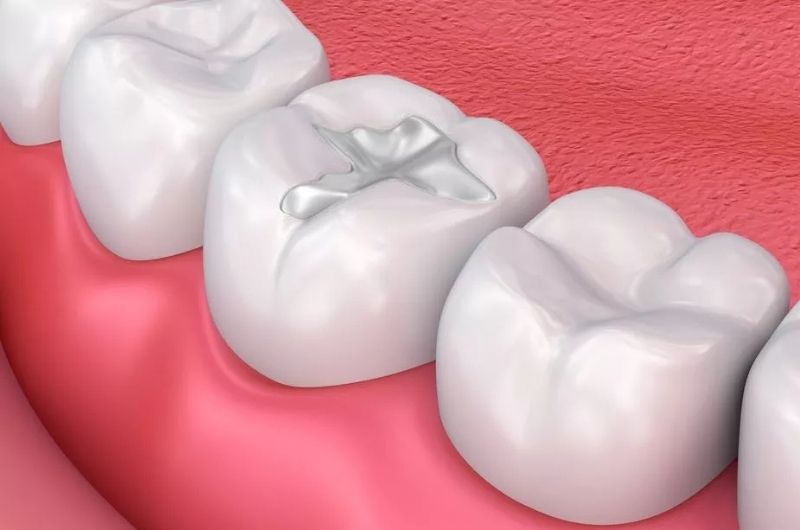
Fillings In Chandkheda
Are you concerned about your cavity-affected teeth and whether they will not be as strong as they used to be? Dental fillings can restore the natural appearance and strength of your teeth. At Dantbatrisa, we provide biocompatible dental fillings in Chandkheda to help you get the best possible results. Continue reading to know what fillings are and how to benefit from them.
What Are Dental Fillings?
Dental fillings are a blend of materials dentists use to fill cavities, holes, or decay in teeth. They restore teeth' integrity and function while preventing decay from spreading. Fillings are applied after removing the decayed portion of the teeth and cleaning the cavity. This helps to prevent the infected teeth from further damage and preserve their natural appearance.
Types of Dental Fillings
Amalgam Fillings:
Amalgam fillings are traditional metal fillings, silver in color, that have a long history of being used to fill cavity holes. They are well suited for people looking for a strong and long-lasting filing. Generally, these are made by mixing metals such as silver, tin, and mercury and are used for back teeth or molars.
Composite Fillings:
Composite fillings are made of tooth-colored resin material, which makes them easily blend in with your natural teeth. They are a great way to fill cavities in the front teeth as they do not compromise the appearance. These fillings are durable and bond to the teeth directly, providing strength and natural beauty.
Ceramic Fillings:
Ceramic fillings closely resemble the natural teeth when used to fill cavity holes. They are highly aesthetic, durable, stain resistant, and can match the color of your natural teeth. They are mostly used for visible parts of the teeth.
Glass Ionomer Fillings:
This type of filling is used to cover and strengthen teeth that are not highly visible. Made with materials that release fluoride, it also helps protect the surrounding tooth structure and prevent further decay. Glass Ionomer Fillings are usually used for the back of teeth or molars.
Your dentist will suggest the best dental filling for your teeth based on your needs and requirements.
Benefits of Dental Fillings
Restores Tooth Function
Dental fillings help restore the strength of your teeth, which allows you to smile, eat, and chew comfortably. This restoration of tooth function helps improve the quality of life.
Prevents Further Decay
Upon sealing the cavity, fillings ensure that the infection does not spread further, both in the same teeth and to other teeth.
Aesthetic Appeal
Composite and ceramic fillings, which are usually tooth-colored, help improve the aesthetics of your smile and you can smile more confidently.
Durable & Long-Lasting
Materials used for fillings are durable and long-lasting to endure chewing pressure.
When Do You Need a Dental Filling?
To Treat Cavities :Fillings can be used to treat cavity-infected teeth by removing the decayed part and replacing it with the filling.
Cracked or Broken Teeth :If you have a broken, cracked, or chipped tooth, you can get a filling to restore its shape and function.
To Prevent Further Decay :Fillings can also be used to treat minor decays before they spread further.
If you have any of the above dental issues and are in needs of dental fillings in Chandkheda, contact our experts at Dantbatrisa.
Frequently Asked Questions (FAQs)
Are dental fillings safe?
Yes. Dental fillings are safe when you have a proper checkup before getting them. The dentist can suggest the best type of filling for you.
How can I prevent cavities after having a filling?
After getting a filling, you must follow good oral hygiene, avoid sweet, sticky, or hard food, and visit the dentist for regular checkups to avoid cavities.
Can I eat immediately after getting a filling?
You can eat shortly after the anesthesia from the procedure wears off.
How do I know if my filling needs to be replaced?
If you notice problems with your teeth or with the fillings, consult your dentist as it may be a sign of a filling replacement.
Frequently Asked Questions
Yes. Dental fillings are safe when you have a proper checkup before getting them. The dentist can suggest the best type of filling for you.
After getting a filling, you must follow good oral hygiene, avoid sweet, sticky, or hard food, and visit the dentist for regular checkups to avoid cavities.
You can eat shortly after the anesthesia from the procedure wears off.
If you notice problems with your teeth or with the fillings, consult your dentist as it may be a sign of a filling replacement.


